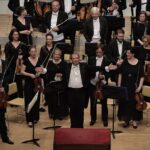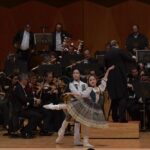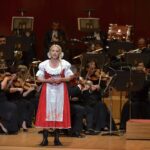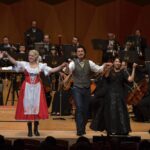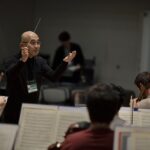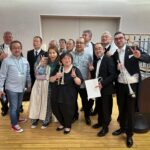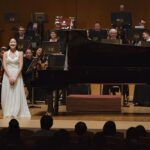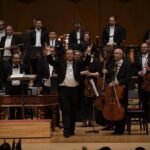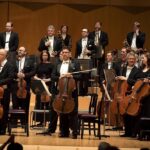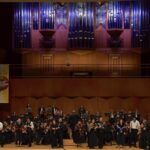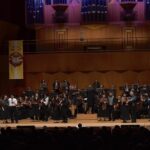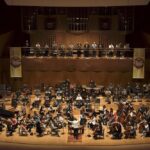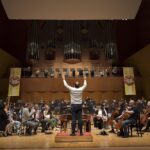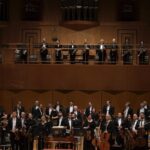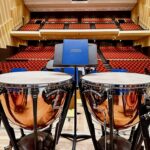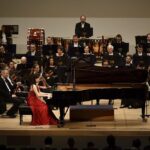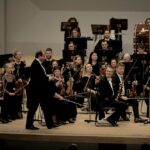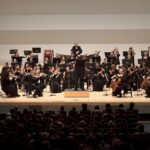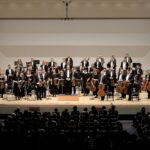JPO returned from an extremely successful tour of Japan, returning with success, experience and their own earthquake adventure
On Wednesday 10 May, the Janáček Philharmonic Ostrava (JPO) returned from an extremely successful tour of Japan. During almost two weeks, the orchestra played nine concerts there together with Czech and local soloists. As the only musical ensemble from the Czech Republic, it represented European music at the prestigious Gargan Music Festival in Kanazawa and performed in three other Japanese cities. The logistically demanding and musically prestigious tour, during which the orchestra played in halls with top-quality acoustics, was also spiced up by its own experience of the earthquake, which had a magnitude of 6.3 on the Richter scale in an epicentre only 100 km away. The musicians and audience were caught by the earthquake during a performance of Dvořák’s Symphony No. 8 at the Ishikawa Ongakudo Hall in Kanazawa.
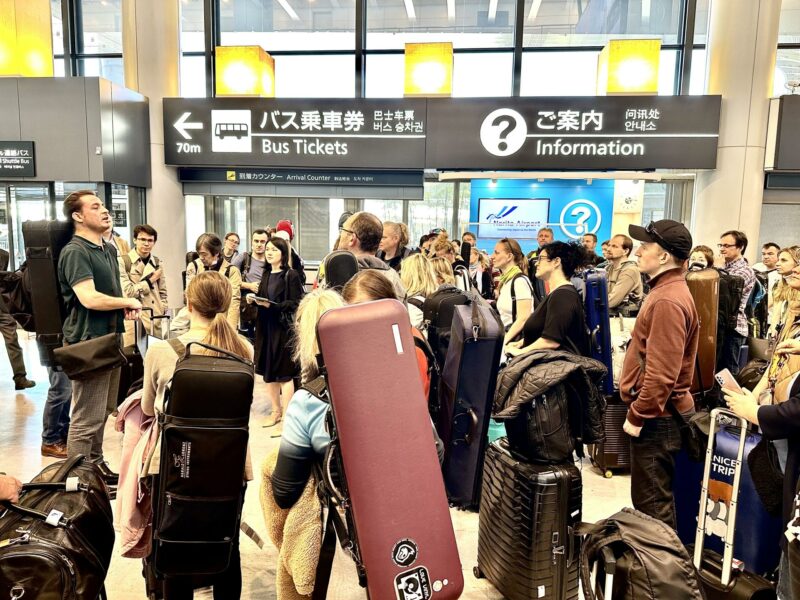
Nine concerts in four Japanese cities, eighty musicians of the Janáček Philharmonic, Czech and foreign soloists and conductor Leoš Svárovský, who shared the baton and conductor’s console with the Japanese rising star Nodoko Okisawa and the experienced Japanese conductor Junichi Hirogami. The Janáček Philharmonic Ostrava, as a world-class orchestra, despite the absence of its own concert hall and adequate facilities, once again tested its performance skills in concert halls with first-class acoustics. The programme of the tour included large symphonic works and chamber music performances. “Our Philharmonic played a selection of European music repertoire, not only under the direction of our conductor. I give them all a huge compliment. Despite the logistical and time-consuming travel, adaptation to a different concert environment and cooperation with local conductors, soloists and choir, their performance was absolutely professional and I am sure that we have left an unforgettable musical mark in Japan,” says JPO Director Jan Žemla, adding that over twelve thousand listeners attended JPO concerts in Japan alone.
The Japanese tour opened with the Janáček Philharmonic Ostrava at the Musashino Civic Cultural Hall, from where it then moved on to the prestigious Gargan Music Festival in Kanazawa. The theme of the festival this year was the music of Central Europe, and so the most famous works by Antonín Dvořák, Bedřich Smetana, Josef Suk, Leoš Janáček, as well as Zoltán Kodály and Ferenc Liszt were performed. “The festival took place during the so-called Golden Week, when the whole country has a holiday. Concerts could therefore take place throughout the day, and due to the fact that, in addition to classical music, traditional Japanese music was also performed, the halls were always almost sold out and the composition of the audience was very varied,” Žemla explains. During the very first concert, the JPO teamed up with Japanese piano soloist Kaoruko Igarashi. “Our musicians were full of energy and in a great mood, which was also enhanced by the excellent acoustics of the concert hall,” says Jan Žemla.
The second concert brought the expected connection with ten Japanese wind players and featured Janáček’s unique Sinfonietta. “The gentlemen and ladies gave an excellent performance, the conductor Leoš Svárovský gave the piece the necessary Moravian esprit, and thanks to the emotional tone of the whole performance, a thunderous applause followed in the hall,” adds Žemla. During the festival, the Camerata Janáček ensemble also presented itself to the local audience in a chamber ensemble, which between the two symphonic concerts performed several other Czech compositions, which were also a great success.
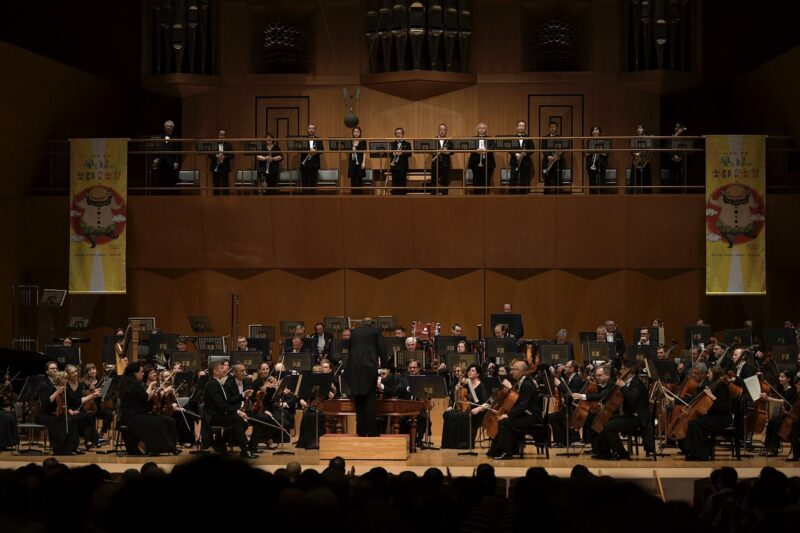
A completely unusual experience for the musicians of the Janáček Philharmonic Ostrava was the concert performance of Bedřich Smetana’s opera The Bartered Bride in collaboration with Japanese soloists and choir. “The stage literally brought together a mixture of personalities and styles. The Czech colours were represented by the balanced performances of Tereza Mátlová as Marenka and Tomáš Černý as Jeník. However, they were complemented by Japanese singers who, with typical Japanese overacting and the use of expressive mime elements, pushed the roles of Vasek (Noriuki Sawabu) and Kecal (Masashi Mori) to bizarre realms for the eye of the European viewer,” says Jan Žemla with a smile, adding that this musical experience, performed in the original, i.e. in the Czech language, was crowned by a precisely prepared local choir and children’s ballet.
Concert at Ishikawa Ongakudo Hall interrupted by earthquake
The last concert of the Gargan Music Festival in Kanazawa brought not only a packed musical programme but also an unpleasant experience with an earthquake, unfortunately not uncommon in Japan. During a performance of Dvořák’s Symphony No. 8, a siren and announcements in Japanese rang out in the hall. “As the siren did not subside, the orchestra stopped playing. At that moment, the seats in the hall swayed and the lights on the ceiling swung. Within moments, ushers ran into the hall and calmed everyone down,” explains JFO director Jan Žemla. The unusual situation affected not only the audience in the hall, but also the musicians on stage. “I had a feeling of anxiety, we heard the alarm and then everything rocked us like on the sea, we stopped playing, but the organisers immediately reassured us that we could continue and there was no further danger,” says Judita Šprochová, deputy concertmaster of the cellos, describing the experience with the earthquake. Subsequently, JPO representatives learned that the epicentre of the earthquake was only one hundred kilometres away from the concert hall and had a magnitude of 6.3 on the Richter scale.
Japan is one of the most attractive classical music markets in the world today. European classical music is extremely popular here, and compositions by Czech composers, especially Bedřich Smetana and Antonín Dvořák, are part of the permanent repertoire of many Japanese music ensembles. However, they are especially appreciated in the interpretation of Czech symphony orchestras. The JPO concluded its Japanese tour with a concert at the Chigasaki Shimin Bunka Kaikan, where the main hall seats 1,381 people. “Once again, I must highlight the performance of conductor Leoš Svárovský, who, in adapting the orchestra to different concert halls, has always adjusted the sound of the orchestra to the specific acoustic conditions in which the concert took place,” says Jan Žemla, director of the Janáček Philharmonic Ostrava.
The activities of the Janáček Philharmonic Ostrava have long been supported by the Statutory City of Ostrava, the Moravian-Silesian Region, the Ministry of Culture and other partners, without whose support this tour would not have been possible. The JPO proves once again that it is an orchestra of top quality, which, despite the lack of its own concert hall and adequate facilities, regularly and with honour performs in the best concert halls around the world. “Taking care of our international reputation is part of our long-term strategy and undoubtedly one of our priorities,” concludes Jan Žemla.
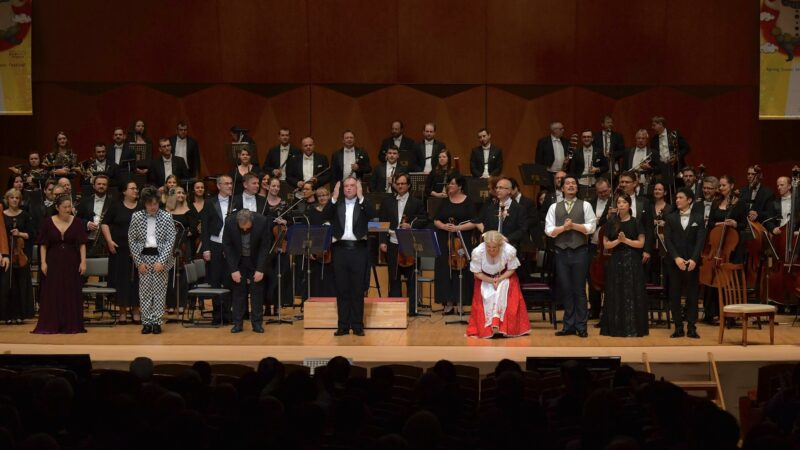
An overview of the repertoire staged for the Japanese concert tour:
Leoš Janáček
Sinfonietta
Bedrich Smetana
Vltava from the cycle My Country / The Bartered Bride, collage from the opera
Antonín Dvořák
Concerto for Cello and Orchestra in B minor Op. 104 / Symphony No. 8 in G major Op. 88 / Symphony No. 9 in E minor “From the New World” Op. 95
Josef Suk
Meditation on Old Czech Chant
Zoltán Kodály
Háry János, suite
Ferenc Liszt
Piano Concerto No. 1 / Hungarian Rhapsody No. 2 / Les Preludes
Robert Schumann
Piano Concerto
The JFO tour to Japan is realized with the financial support of the Ministry of Culture, the National Restoration Plan, the European Union, the Statutory City of Ostrava and the Moravian-Silesian Region.


